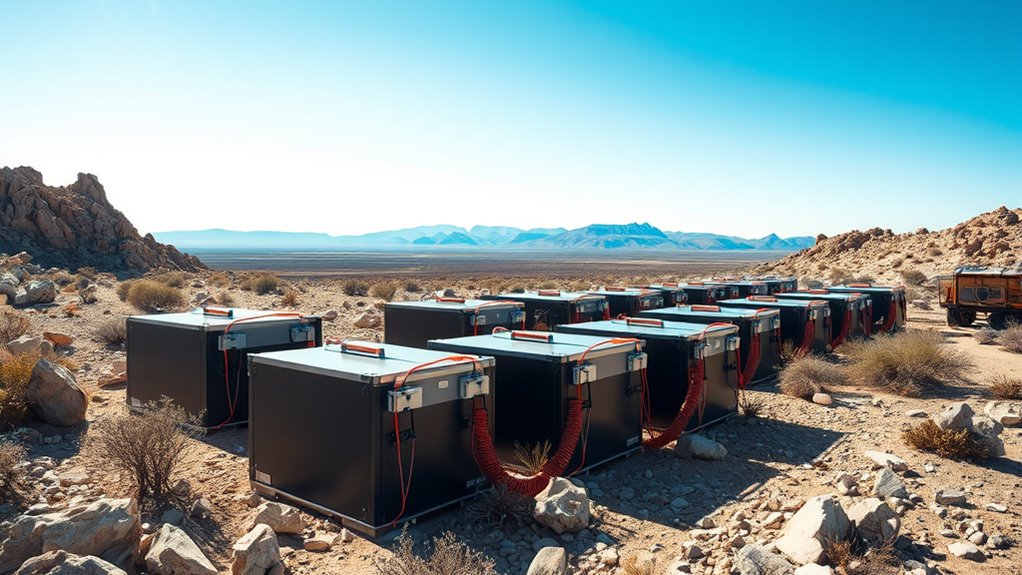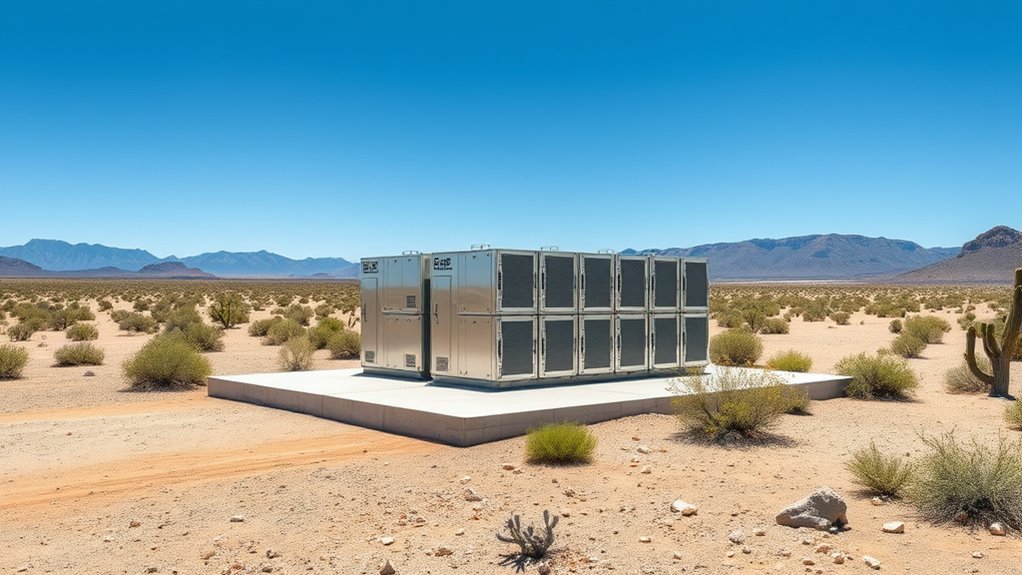Battery storage plays a essential role in off-grid operations by providing a reliable power supply when renewable sources like solar or wind aren’t available. It captures excess energy during peak times, prevents system failures, and helps you use your renewable energy efficiently. Choosing the right batteries, like lithium-ion or lead-acid, depends on your needs and budget. Keep exploring to discover how proper storage can keep your off-grid system resilient and sustainable.
Key Takeaways
- Ensures reliable power supply during periods without sunlight or wind, maintaining continuous off-grid operations.
- Facilitates efficient integration with renewable sources, preventing overcharging and optimizing energy use.
- Selection of suitable battery technology (e.g., lithium-ion vs. lead-acid) depends on energy needs, budget, and environmental conditions.
- Proper storage extends battery lifespan, minimizes energy waste, and enhances system resilience.
- Enhances off-grid system stability, reduces reliance on backup generators, and promotes sustainable energy independence.

Off-grid operations rely heavily on effective energy storage solutions to guarantee a consistent power supply, especially when sunlight or wind isn’t available. Without a reliable way to store energy, your system can falter during cloudy days or calm periods, disrupting your activities and reducing efficiency. That’s where battery storage comes into play, acting as the backbone of your off-grid power system. It allows you to capture excess energy generated during peak times—like bright sunny days or windy periods—and use it when production drops. This continuous energy supply is vital for maintaining operations, whether you’re running a remote farm, a cabin, or a small community.
Effective energy storage is vital for reliable off-grid power during cloudy days and calm periods.
When considering battery storage, one of the key aspects you’ll need to focus on is how well it integrates with your existing renewable energy sources. Grid integration might sound more relevant for utility-scale systems, but even off-grid setups benefit from understanding how batteries interact with solar panels or wind turbines. Proper integration ensures that energy flows smoothly, avoiding issues like overcharging or unnecessary discharges, which can shorten your battery’s lifespan. You want a system that intelligently manages energy, prioritizing renewable sources to maximize efficiency and reduce reliance on backup generators or other fossil fuels. A well-designed renewable energy storage setup can seamlessly transfer energy from your renewable sources into the batteries, and then back out when needed, ensuring your off-grid operation remains stable and resilient.
Battery technology has advanced considerably, offering various options tailored to off-grid needs. Lithium-ion batteries, for example, provide high energy density, long cycle life, and fast charging capabilities, making them ideal for most off-grid applications. Lead-acid batteries, though more affordable, demand more maintenance and have shorter lifespans. Choosing the right battery depends on your energy demands, budget, and the specific environmental conditions of your location. Additionally, understanding how top projectors for gaming enthusiasts optimize their performance with high refresh rates and low input lag can inform your choices for reliable, high-quality energy storage.
Regardless of the type, the goal remains the same: to maximize renewable energy storage, minimize energy waste, and extend the longevity of your storage system. Ultimately, integrating effective battery storage into your off-grid setup transforms your renewable energy sources from intermittent to reliable. It empowers you to harness natural resources efficiently, ensuring a steady power supply regardless of weather conditions. By focusing on grid integration principles and selecting the right storage technology, you can optimize your off-grid operation’s performance, reduce downtime, and make the most of your renewable energy investments. This way, you gain independence from traditional power grids and build a resilient, sustainable energy foundation for your needs.
Frequently Asked Questions
What Are the Latest Advancements in Off-Grid Battery Technology?
You’ll find that recent advancements in off-grid battery technology focus on better solar integration and smarter battery management systems. New lithium-ion and solid-state batteries now store more energy efficiently, with faster charging and longer lifespans. Improved battery management systems optimize performance, prevent overcharging, and extend durability. These innovations allow for more reliable, sustainable off-grid power solutions, giving you greater independence and peace of mind in remote or off-grid locations.
How Do Battery Warranties Compare Across Brands?
Imagine you’re choosing a battery brand, and one offers a five-year warranty covering 80% battery longevity, while another provides a ten-year warranty with full coverage. You’ll find warranty coverage varies widely—some brands offer longer terms but with stricter conditions, while others focus on battery longevity. Comparing warranties helps you understand which brand offers better protection, ensuring your off-grid setup remains reliable and cost-effective over time.
What Are the Environmental Impacts of Off-Grid Batteries?
You should consider that off-grid batteries can have significant environmental impacts, mainly due to resource extraction and recycling challenges. Mining for materials like lithium and cobalt can harm ecosystems, while recycling batteries often faces hurdles, leading to hazardous waste. To minimize your environmental footprint, choose batteries with sustainable sourcing and support programs that improve recycling methods, ensuring less waste and reduced harm to the planet.
How to Properly Dispose of or Recycle Used Batteries?
Think of giving your used batteries a gentle farewell through proper disposal and recycling. You should take your batteries to designated recycling centers or collection points that handle battery recycling securely. Avoid tossing them in regular trash to prevent environmental harm. Always follow recommended disposal methods to ensure batteries are responsibly managed, helping protect our planet while keeping your off-grid setup eco-friendly.
Are There Government Incentives for Off-Grid Battery Systems?
Yes, there are government incentives and policy support available for off-grid battery systems. You can take advantage of tax credits, rebates, and grants designed to promote renewable energy and energy independence. These incentives aim to reduce your upfront costs and encourage sustainable practices. Check with local, state, or federal programs to find specific opportunities, as policies vary by region and are continually updated to support clean energy initiatives.
Conclusion
Imagine powering an entire village with a single battery storage system that’s so reliable, it’s like having a tiny, unstoppable energy fortress in your hands. Off-grid operations become effortless, and blackouts? They’re gone forever, replaced by a steady, glowing stream of power that feels almost magical. With the right battery storage, you’re not just off-grid—you’re ruling your energy universe, turning every dark night into a bright, unstoppable adventure.









